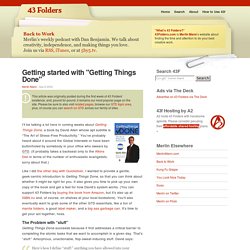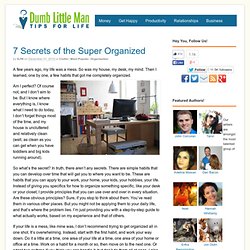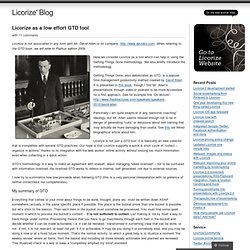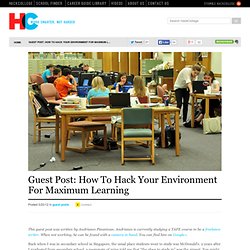

Getting started with "Getting Things Done". This article was originally posted during the first week of 43 Folders' existence, and, pound for pound, it remains our most popular page on the site.

Please be sure to also visit related pages, browse our GTD topic area, plus, of course you can search on GTD across our family of sites. I’ll be talking a lot here in coming weeks about Getting Things Done, a book by David Allen whose apt subtitle is “The Art of Stress-Free Productivity.” You’ve probably heard about it around the Global Interweb or have been buttonholed by somebody in your office who swears by GTD. (It probably takes a backseat only to the Atkins Diet in terms of the number of enthusiastic evangelists: sorry about that.) Like I did the other day with Quicksilver, I wanted to provide a gentle, geek-centric introduction to Getting Things Done, so that you can think about whether it might be right for you. The Problem with “stuff” Stuff is bouncing around in our heads and causing untold stress and anxiety.
Productivity 101: A Primer to the Getting Things Done (GTD) Philosophy. Free Your Mind with GTD. 7 Secrets of the Super Organized. A few years ago, my life was a mess.

So was my house, my desk, my mind. Then I learned, one by one, a few habits that got me completely organized. Am I perfect? Of course not, and I don’t aim to be. But I know where everything is, I know what I need to do today, I don’t forget things most of the time, and my house is uncluttered and relatively clean (well, as clean as you can get when you have toddlers and big kids running around). So what’s the secret? Are these obvious principles? If your life is a mess, like mine was, I don’t recommend trying to get organized all in one shot. So here are the 7 habits: Reduce before organizing. If you take your closet full of 100 things and throw out all but the 10 things you love and use, now you don’t need a fancy closet organizer. How to reduce: take everything out of a closet or drawer or other container (including your schedule), clean it out, and only put back those items you truly love and really use on a regular basis.
Productivity GTD. As a low effort GTD tool « Licorize' Blog. Licorize is not associated in any form with Mr.

David Allen or its company, When referring to the GTD book, we will refer to Piatkus edition 2009. Here we consider Licorize as a tool which can help in using the Getting Things Done methodology. We also briefly introduce the methodology. Getting Things Done, also abbreviated as GTD, is a popular time management productivity method created by David Allen. It is presented in this book, though I find Mr. Personally I am quite skeptical of any “personal coaching” ideology, but Mr. Licorize is not just a GTD tool: it is basically an idea collector that is compatible with several GTD practices. GTD’s methodology is a way to make an agreement with oneself, about managing “ideas overload” – not to be confused with information overload: the overload GTD wants to relieve is internal, self generated, not due to external sources. My summary of GTD In basket Licorize facilitates putting everything that you are taking a mental note of in the basket.
Practicing Simplified GTD. David Allen: Getting Things Done. Train Your Brain for Monk-Like Focus. Guest Post: How To Hack Your Environment For Maximum Learning. This guest post was written by Andrianes Pinantoan.

Andrianes is currently studying a TAFE course to be a freelance writer. When not working, he can be found with a camera in hand. You can find him on Google+. Back when I was in secondary school in Singapore, the usual place students went to study was McDonald’s. 2 years after I graduated from secondary school, a roommate of mine told me that “the place to study in” was the airport. You might think that as long as you qare studying, it doesn’t matter where you do it, but your learning environment actually plays a huge role in your learning efficiency and effectiveness.
So how do our learning environments affect our study? Physical: Physical elements include noise, lighting and temperature levels. Noise causes fatigue and may reduce productivity by up to 66%. That’s the problem with noise. One of the best investments I’ve ever made is buying earplugs. Functional - The next element of the environment is functionality.